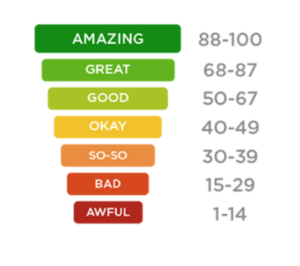Just the Ticket: The Evolution of SeatGeek

SeatGeek has evolved from an aggregation platform to a platform that competes directly with large incumbents like StubHub and Ticketmaster for the business of re-sellers and original ticket rights holders.
Ticketing for live entertainment is an industry full of platform companies. The U.S. market for online event ticket sales is roughly $9 billion and has averaged a low double-digit growth rate for the past five years.[i] The industry has been dominated in recent years by Ticketmaster and StubHub.[ii] SeatGeek, founded in 2009, offers a fascinating journey of a platform player that has shifted its strategy over time from complementing the large players to competing directly against them.
At their core, ticketing platforms serve two primary sides: ticket buyers and ticket sellers. The sellers are often broken down into two types: the original rights holders and re-sellers. Platforms provide a mechanism through which sellers can post their tickets at their desired price. Prospective buyers can browse tickets and make purchases. The platform typically claims either a percentage of the ticket price from the seller and/or a service fee from the buyer.
SeatGeek began as a pure aggregator, like Kayak is for the travel industry.[iii] Instead of having sellers post tickets directly to their site/app, SeatGeek aggregated tickets being offered on many different re-seller platforms and allowed users to compare those aggregated prices. When a buyer made a purchase, the platform on which the ticket was listed would pay a referral fee to SeatGeek.[iv] By entering the market in this way, SeatGeek was able to complement the incumbents and avoid their ire. Additionally, this strategy enabled SeatGeek to gather a lot of data which they used to improve the customer experience. They created a proprietary “Deal Score” algorithm that helped ticket buyers determine whether a ticket seller’s offer was a good value based on factors such as seat location, historical prices, prices of other seats, and event popularity (see pictures below).[v]
As SeatGeek grew, StubHub came to view SeatGeek as a threat to its business rather than just a complement.[vi] In 2014, StubHub removed all their tickets from the SeatGeek site. SeatGeek responded by deciding to add direct re-sale services to their platform, thus allowing sellers to post tickets directly to their site. The company has taken many steps to differentiate themselves from the competition in the eyes of both buyers and sellers. From the buyers’ perspective, SeatGeek has prided itself on providing transparent pricing and only charging the sellers for their service.[vii] That helps to attract buyers who are bothered by the high “service fees” on other sites. Additionally, both buyers and sellers benefit from SeatGeek’s investment in a top-notch mobile experience. As of late 2012, 75% of SeatGeek purchases occurred on mobile compared to just 36% for StubHub and 21% for Ticketmaster.[viii] It’s also free and simple for a user to transfer tickets to another person using the SeatGeek app (something that StubHub and Ticketmaster’s apps didn’t allow at the time).[ix] This feature elicits direct network effects as both parties looking to complete the transfer will need the app. Finally, ticket sellers can receive payment directly into their Venmo account, lowering any barriers for users who prefer not to divulge their banking information.[x] Offering these sorts of conveniences to users could help to reduce multi-homing in an industry in which that’s a very common practice.
SeatGeek’s most recent move attempts to establish the company in the market for ticket sales from right’s holders (such as sports teams, concert venues, or artists). In 2016 they rolled out SeatGeek Open which is an open API that third-party companies can build into their own sites/apps or those of collaborators.[xi] Thus, sellers will be able to use SeatGeek functionality to sell tickets without posting their tickets on the SeatGeek site/app (SeatGeek will continue to claim a % of sales as commission). This opens the door for the possibility of interesting collaborations. For example, a sports team could partner with Uber to sell both tickets and rides to the game through the Uber app.[xii] Other potential channels through which the API could enable ticket sales include Amazon, Facebook Messenger, or artists’ own websites.[xiii] Ticketmaster also released it’s own API in 2016, but SeatGeek’s differs in that anyone is allowed to use it while Ticketmaster requires the third-party company to enter into some degree of partnership first.[xiv]
In less than ten years of existence, SeatGeek has undergone a significant transformation from a seemingly unremarkable aggregator platform to an innovative threat to the industry’s incumbents. While the incumbents’ scale is still formidable, they’re undoubtedly having to take note of this upstart that is giving ticket buyers and sellers the ability to complete transactions on their terms.
Sources:
[i] https://www.ibisworld.com/industry-trends/specialized-market-research-reports/online-retail/lifestyle-services/online-event-ticket-sales.html
[ii] https://finance.yahoo.com/news/stubhub-recognized-single-source-ticketing-011011659.html
[iii] https://www.bloomberg.com/news/articles/2015-12-17/ticket-aggregator-seatgeek-moves-into-reselling-takes-on-stubhub
[iv] https://www.bloomberg.com/news/articles/2015-12-17/ticket-aggregator-seatgeek-moves-into-reselling-takes-on-stubhub
[v] https://seatgeek.com/deal-score
[vi] https://www.bloomberg.com/news/articles/2015-12-17/ticket-aggregator-seatgeek-moves-into-reselling-takes-on-stubhub
[vii] http://vator.tv/news/2015-11-19-seatgeek-targets-stubhub-with-new-ticket-marketplace
[viii] https://www.bloomberg.com/news/articles/2015-12-17/ticket-aggregator-seatgeek-moves-into-reselling-takes-on-stubhub
[ix] https://www.bloomberg.com/news/articles/2015-12-17/ticket-aggregator-seatgeek-moves-into-reselling-takes-on-stubhub
[x] http://vator.tv/news/2015-11-19-seatgeek-targets-stubhub-with-new-ticket-marketplace
[xi] https://venturebeat.com/2016/08/11/seatgeek-takes-on-ticketmaster-with-primary-ticketing-platform-that-can-be-integrated-into-any-app/
[xii] https://venturebeat.com/2016/08/11/seatgeek-takes-on-ticketmaster-with-primary-ticketing-platform-that-can-be-integrated-into-any-app/
[xiii] https://venturebeat.com/2016/08/11/seatgeek-takes-on-ticketmaster-with-primary-ticketing-platform-that-can-be-integrated-into-any-app/
[xiv] https://venturebeat.com/2016/08/11/seatgeek-takes-on-ticketmaster-with-primary-ticketing-platform-that-can-be-integrated-into-any-app/





Great post – it reminded me of an older podcast from Planet Money on pricing problems that artists run into on tours – the mismatch between what people are willing to pay, and supply of tickets (leading to scalpers). Do you think that SeatGeek would ever try to share data and advise on pricing for artists or sporting events to help lower the scalping problem and allow performers to capture more of the value that people are willing to pay to see them preform?
https://www.npr.org/sections/money/2013/06/25/195641030/episode-468-kid-rock-vs-the-scalpers
Interesting post! It’s fascinating that SeatGeek’s mobile application has been so much more popular than Ticketmaster and StubHub’s. These companies have done a really good job at limiting disintermediation by preventing users and sellers from connecting directly. Many ticket sellers are professional resellers and if a user was able to develop a trusted relationship with a particular seller, they could go straight to that seller whenever they needed tickets and avoid the ludicrous service fees that these sites typically charge. In such an extremely competitive industry, it’ll be interesting to see if SeatGeek can achieve sustainable growth.
Great post. I am a huge fan of SeatGeek. In a competitive market with parties that are incentived to multi-home, SeatGeek has created a product that is cheaper and more user friendly because of the transparency provided by the deal scoring algorithm. If they are able to complete some of the initiatives you discuss in your post above, I believe they will continue to compete well against the established players such as Ticketmaster and StubHub.
Thanks for your post! SeatGeek Open is a particularly interesting move. I think most companies think like Ticketmaster, and want to route a transaction back to its own website and keep its own brand’s visibility, as well as protect itself through a formal partnership agreement. However, SeatGeek’s open platform and not needing several months of partnership negotiations will lower barriers for other companies to try out SeatGeek quickly, and the company may be betting on rapidly increasing its scope and market share first. However, SeatGeek has brand risk if less reputable or less tech-savvy companies don’t quite execute the integration properly and damage customers’ perception of SeatGeek.